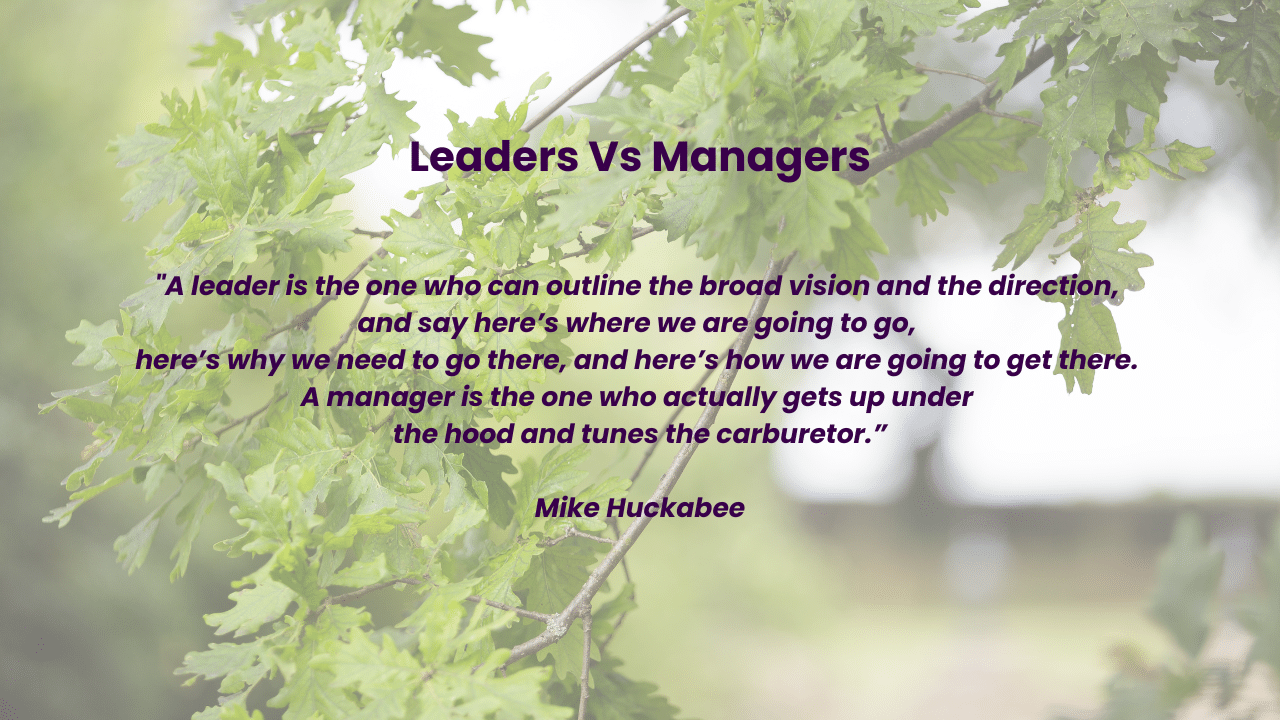Leaders vs Managers
To really master control of your business you need to have great management and leadership in place. These are different skill sets and require a different set of behaviours.
Occasionally, a really exceptional individual is able to play both of these roles. But more often, the skills come from a pair, or group of people, in your business.
“A leader is the one who can outline the broad vision and the direction, and say here’s where we are going to go, here’s why we need to go there, and here’s how we are going to get there. A manager is the one who actually gets up under the hood and tunes the carburetor.”
Mike Huckabee
To ensure that your business is driven effectively you need to think about the characteristics that are needed to bring real direction to your business.
Leadership
Is about guiding people to achieve the right behaviour. A strong leader inspires vision, and motivates people to achieve.
There are a few characteristics that can be brought to the fore in order to create strong leadership:
- Empathy: A truly great leader develops a strong understanding of their team. Moreover, they should have the skills and experience to identify the needs of their team through patient listening. Similarly, they should be able to respond to those needs with constructive coaching and development. Every team member has room for improvement. Without great empathy, you cannot identify these needs and turn them into strengths.
- Vulnerability: No team member is without flaws. If you want to run a team where critical feedback is willingly accepted, you need to demonstrate that you are able to recognise your own weaknesses. Being prepared to opening discuss your own mistakes and challenges will connect you better to the team. It will foster a culture of constant improvement, honesty, and openness.
- Innovation: Implementing change, driving development, and supporting a diverse group of individuals requires constant creativity. Adapting leadership styles, finding new ways of engaging and developing new processes and practices are a key requirement in a highly dynamic team. Subsequently, really innovative people lead more effectively.
Management
Is about the implementation of structure. Managers take control of the activities of the team to ensure that they are delivering on their expectations. Managers enjoy structure and thrive in implementing it.
A talented manager uses the following skills to drive outcomes:
- Set Expectations: They will ensure that everyone in the business is very clear about what is required of them. They explain the detail of the task and the reasons for carrying it out in a certain way. A manager that sets great expectations empowers a team to deliver what the business needs. They are very clear about the measures for success and they track and review these measures regularly.
- Provide Accountability: The manager in the business is the key point of accountability. Not only do they track and measure the success criteria of the team, but they share these performance measures back to the team. They provide praise for the teams’ achievements. Or alternatively, provide coaching and guidance around the areas of underperformance. This type of accountability culture is present in all high-performing teams.
- Give Feedback: Creating a culture of feedback is fundamental in a high-performing environment. Teams who openly discuss their performance, share ideas and find solutions, collaboratively outperform those teams that do not. The manager of the team must set the tone of feedback by creating a functional mechanism for it.
Whether you naturally display the traits of a strong leader or manager, or you recognise the need to develop them, there are ways in which each individual can become more competent in these areas.
You should be thinking right now about your business. Who is leading and who is managing your teams to ensure you have the right drive and balance?

